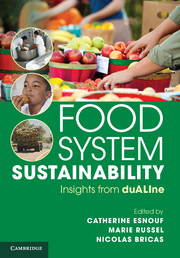Book contents
- Frontmatter
- Contents
- Foreword
- Acknowledgements
- Introduction
- 1 Context: new challenges for food systems
- 2 Consumption and consumers
- 3 Carbon footprint and nutritional quality of diets in France
- 4 Food systems
- 5 Industrial organisation and sustainability
- 6 Urbanisation and the sustainability of food systems
- 7 Losses and wastage
- 8 International trade, price volatility and standards for sustainability
- 9 Elements for a foresight debate on food sustainability
- 10 A critical panorama of methods used to assess food sustainability
- Conclusion
- References
- List of abbreviations
- List of duALIne experts
- Index
6 - Urbanisation and the sustainability of food systems
Published online by Cambridge University Press: 05 April 2013
- Frontmatter
- Contents
- Foreword
- Acknowledgements
- Introduction
- 1 Context: new challenges for food systems
- 2 Consumption and consumers
- 3 Carbon footprint and nutritional quality of diets in France
- 4 Food systems
- 5 Industrial organisation and sustainability
- 6 Urbanisation and the sustainability of food systems
- 7 Losses and wastage
- 8 International trade, price volatility and standards for sustainability
- 9 Elements for a foresight debate on food sustainability
- 10 A critical panorama of methods used to assess food sustainability
- Conclusion
- References
- List of abbreviations
- List of duALIne experts
- Index
Summary
When dealing with the sustainability of food systems, the spatial dimension merits particular attention. On the one hand, growing urbanisation and urban sprawl in different parts of the world raise questions regarding the sustainability of food supply systems for urban populations. On the other hand, the location of different activities in food systems has a strong effect on the environmental assessment of food systems.
This chapter is distinctive from current scientific literature insofar as the sustainability of food systems is analysed, first, in terms of food supplies to cities, and second, by focusing on location strategies relative to production, processing and distribution activities linked to urban dynamics.
Sustainably feeding large cities: a major challenge
The challenges of food sustainability cannot be fully understood without taking account of the spatial dynamics of consumption, distribution, processing and production activities in different countries of the world. On the one hand, changes to diets and consumption practices have exerted a major impact on the spatial organisation of the agricultural and food sectors and hence on greenhouse gas emissions and the amount of energy consumed for the shipment of commodities.
- Type
- Chapter
- Information
- Food System SustainabilityInsights From duALIne, pp. 115 - 135Publisher: Cambridge University PressPrint publication year: 2013



